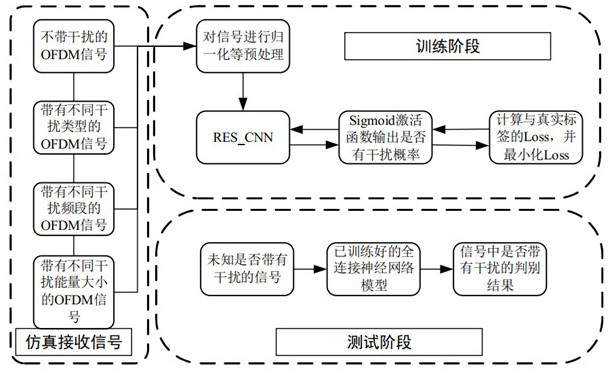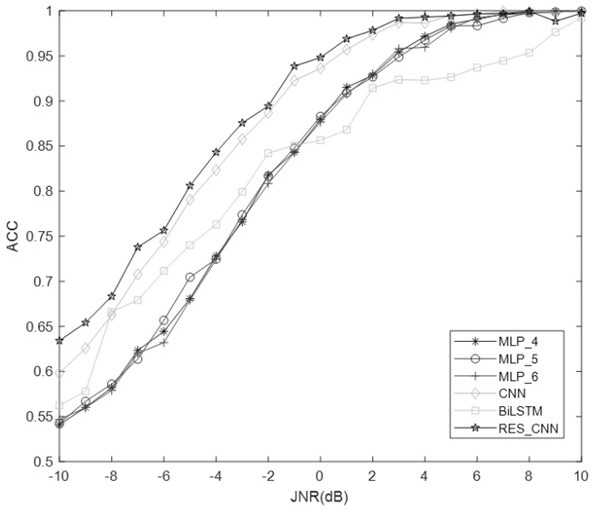Communication Interference Existence Detection Method Based on Residual Connection and Dilated Convolution
A technology for communication interference and detection methods, applied in neural learning methods, transmission monitoring, biological neural network models, etc., can solve the problems of high pressure of artificially constructing features, affecting the correct transmission of useful signals, and low accuracy of interference monitoring. The effect of enhancing generalization performance, breaking asymmetry, and maintaining original data resolution
- Summary
- Abstract
- Description
- Claims
- Application Information
AI Technical Summary
Problems solved by technology
Method used
Image
Examples
Embodiment 1
[0059] A method for detecting the existence of communication interference based on residual connection and dilated convolution, including the following steps:
[0060] Step 1. Construct the interference presence detection data set, and simulate the system signals under different interference-to-noise ratios and the system signals with interference;
[0061] Step 2, establishing an interference existence detection model for detecting interference in system signals; the interference existence detection model is based on residual connection and dilated convolution;
[0062] Step 3, using the interference presence detection data set described in step 1 to train the interference presence detection model in step 2, so that it converges to obtain the final interference presence detection model;
[0063] Step 4, collect the real communication data, and obtain the power spectrum data of the real communication data, input it into the final interference existence detection model, and obt...
Embodiment 2
[0107] This embodiment adopts the detection accuracy between the interference existence detection model based on residual connection and dilated convolution in embodiment 1 and the neural network based on multi-layer fully connected layers, the neural network based on convolution and the neural network based on cyclic neural network Compared.
[0108] In this embodiment, a simulation of interference presence detection is performed on signal power spectrum data under different interference-to-noise ratios, and the selected interference-to-noise ratio range JNR=[-10:1:10]dB.
[0109] The neural network based on multi-layer fully connected layers mainly uses 4, 5, and 6 layers of fully connected neural networks. The number of neurons in each layer of the 4-layer network is [256, 128, 64, 1], and the number of neurons in each layer of the 5-layer network is [512,256,128,64,1], the number of neurons in each layer of the 6-layer network is [512,256,128,64,32,1], the activation funct...
Embodiment 3
[0117] This embodiment is a simulation comparison of prediction speeds between different models in Embodiment 2.
[0118] Test the models trained by each interference detection model on 3000 verification sets, set the batch size to 32, record the total running time, and calculate the number of predicted samples per second for each interference detection model, and the results of the number of predicted samples per second are shown in the table 1.
[0119] Table 1 Comparison of the number of samples predicted per second by different neural networks
[0120] Interference Detection Presence Detection Model Prediction samples per second 4 layers of fully connected layers (MLP_3) 27961 5 layers of fully connected layers (MLP_4) 23697 6 layers of fully connected layers (MLP_5) 19394 Interference Detection Model Based on Convolutional Neural Network (CNN) 843 Interference Detection Model (BiLSTM) Based on Recurrent Neural Network 382 Int...
PUM
 Login to View More
Login to View More Abstract
Description
Claims
Application Information
 Login to View More
Login to View More - R&D
- Intellectual Property
- Life Sciences
- Materials
- Tech Scout
- Unparalleled Data Quality
- Higher Quality Content
- 60% Fewer Hallucinations
Browse by: Latest US Patents, China's latest patents, Technical Efficacy Thesaurus, Application Domain, Technology Topic, Popular Technical Reports.
© 2025 PatSnap. All rights reserved.Legal|Privacy policy|Modern Slavery Act Transparency Statement|Sitemap|About US| Contact US: help@patsnap.com



